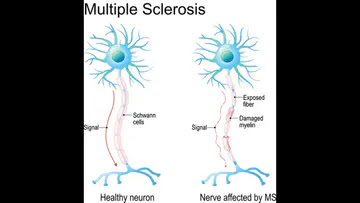
Hollywood actress Selma Blair on Monday quit the competition show "Dancing with the Stars" citing her health. The actress revealed that in 2018 she was diagnosed with multiple sclerosis. It is a disease of the central nervous system . He told his partner Sasha Farber, “My condition was being monitored for a long time and I am in touch with my doctors. I got an MRI done and after the result came, I came to know that I will not be able to continue this competition show. "My bone is hurt and swollen, and by being on this show I can do more damage to my body, which I definitely don't want."
Neurologist Dr Sumit Kumar of Regency Superspecialty Hospital spoke to Tv9 on this disease and said, Multiple sclerosis is a disease that affects the central nervous system. The disease is not directly genetic, but people who are related to someone with multiple sclerosis are more likely to develop it. Siblings or children of someone with multiple sclerosis are also at risk of getting this disease. According to estimates, this disease is found in about two-three people out of 100.
"With the increasing number of neurologists and the easy and cheap availability of magnetic resonance imaging (MRI), more cases are now being diagnosed," he said.
What are the common symptoms of multiple sclerosis
He said these symptoms should be monitored for early detection of multiple sclerosis:
Weakness in limbs: The person may feel weakness in the legs and arms and may find it difficult to move them easily.
Numbness and tingling feeling: A pins and needles feeling in the body is one of the early symptoms of multiple sclerosis and can affect the face, body, arms and legs.
Lhermitte's sign: A person may experience an electric shock-like sensation when they move their neck.
Bladder problems: A person may find it difficult to urinate or feel the need to urinate frequently. Lack of bladder control is an early sign of multiple sclerosis.
Dr. Kumar said, “Apart from the above-mentioned symptoms, there are some other early signs of multiple sclerosis. Bowel incontinence can occur due to constipation and pain.
One may experience fatigue which can impair a person's ability to function at work or home and is one of the most common symptoms of multiple sclerosis. Spasticity and muscle cramps are also early symptoms of multiple sclerosis.
There is damage to the tissue present in the bones of the spine
Dr Kumar explained, “It can damage the nerve fibers in the spinal cord. It can cause painful spasms in the muscles of the brain including the legs. Some people may experience tremors because of MS. Some people may have problems with double or blurred vision. One thing appears two in double vision. Due to this, the eyesight can be partially or completely lost. Multiple sclerosis can change the way people walk due to muscle weakness and balance problems.
He further said that due to demyelination and nerve fiber damage in the brain, emotional changes can also occur in a person. According to him, “Many people may find it difficult to focus, plan, learn, prioritize and multitasking. Neuropathic pain is caused by multiple sclerosis. Sometimes it includes problems like headache, hearing loss, itching, breathing problems, difficulty in speaking and difficulty in swallowing.
No cure for this disease
Dr Kumar said, “Sadly, there is no cure for multiple sclerosis as of now. However, a lot of research is going on to develop new and better therapies (DMT) for this disease of the central nervous system.”
The drugs reduce the frequency and severity of multiple sclerosis attacks. Most of the therapies approved by the Food and Drug Administration (FDA) since the early 1990s are effective in managing multiple sclerosis, helping 85–90 percent of people with the disease.
Although there are drugs that can reduce the frequency of multiple sclerosis attacks, the disease cannot be completely eliminated as there are risk factors for this condition that you cannot change. such as age and genetics.
Dr Kumar concludes, “However, by making some changes in your lifestyle, your risk of getting multiple sclerosis can be reduced. Its progress can be slowed down by diet, exercise, medication, and early detection.











No comments:
Post a Comment